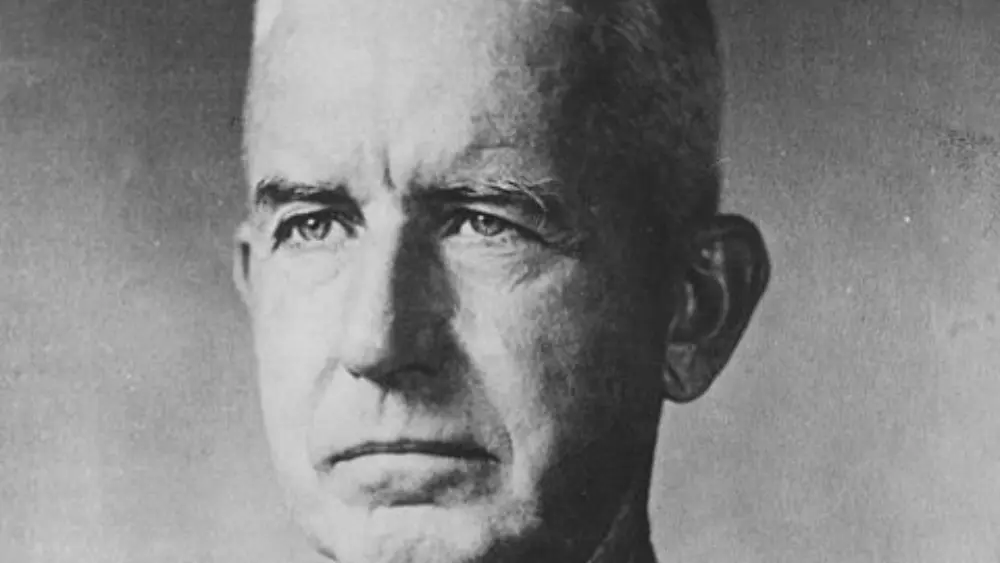Oliver P. Smith, born on October 26, 1893, in Menard, Texas, emerged as a distinguished figure in the annals of U.S. military history. Renowned for his tactical brilliance and leadership during the Korean War, Smith commanded the 1st Marine Division at the Chosin Reservoir.
Early Years and Military Service
Oliver P. Smith’s early years were shaped by a Texan upbringing, instilling in him a profound sense of duty and discipline. His journey into military service commenced with his commission as a Marine Corps second lieutenant in 1917. Smith’s initial assignments saw him deployed to Haiti and China, where he gained valuable experience in navigating diverse and challenging operational environments. These early military experiences not only exposed him to different cultures and geopolitical complexities but also laid the groundwork for the leadership skills that would come to define his illustrious career.
Smith’s formative years in the Marine Corps established a foundation for his future role as a distinguished military leader. The challenges and responsibilities he faced during his early deployments contributed to the development of his strategic acumen and honed his ability to lead in diverse and dynamic settings. Little did he know that these early experiences were but the prelude to a remarkable military career that would see him play a crucial role in some of the defining conflicts of the 20th century.
Oliver P. Smith: World War II Leadership
Oliver P. Smith’s leadership during World War II in the Pacific theater solidified his reputation as a strategic thinker and operational expert. Serving in key roles, Smith played a crucial part in the Battle of Guam, where his leadership contributed to the successful recapture of the island from Japanese forces. His performance in this and subsequent island-hopping campaigns underscored his ability to plan and execute effective amphibious operations, showcasing a tactical acumen that earned him widespread recognition among his peers and superiors.
Smith’s contributions during World War II extended beyond individual battles. He became known for his commitment to the Marine Corps’ amphibious warfare doctrine. His leadership style emphasized thorough planning, coordination, and adaptability, ensuring the success of amphibious assaults in challenging Pacific environments. Smith’s strategic thinking and operational expertise in the Pacific theater laid a foundation for his later command roles and left an enduring impact on the Marine Corps’ approach to amphibious operations.
Command of the 1st Marine Division in Korea
Oliver P. Smith’s pivotal moment in his military career occurred during the Korean War when he assumed command of the 1st Marine Division in 1950. Tasked with leading his division during a conflict that unfolded rapidly and presented harsh operational challenges, Smith demonstrated exceptional leadership skills. The Korean War, marked by fluid and unpredictable battles, required commanders with the ability to adapt quickly to evolving circumstances. Smith’s leadership of the 1st Marine Division highlighted his strategic skill and ability to handle the challenges of a rapidly changing and intense battle situation.
As the Korean War progressed, Smith’s leadership became particularly noteworthy during the Battle of Chosin Reservoir. Smith’s division executed a successful fighting withdrawal under his command, facing overwhelming Chinese forces and brutal weather conditions. His ability to make sound decisions in the midst of adversity and skillfully manage his forces in challenging circumstances solidified his reputation as a respected military leader. The Battle of Chosin Reservoir and Smith’s leadership during this critical phase of the Korean War became a testament to his resilience, strategic thinking, and dedication to the welfare of his troops.
Oliver P. Smith: The Battle of Chosin Reservoir
Oliver P. Smith faced a defining moment in his military career during the Battle of Chosin Reservoir in late 1950. Under his command, the 1st Marine Division found itself surrounded by overwhelming Chinese forces in the harsh sub-zero temperatures of North Korea. In the face of this dire situation, Smith’s leadership skills were put to the ultimate test. Displaying strategic acumen and a keen understanding of military tactics, he orchestrated a masterful fighting withdrawal, navigating his division through challenging terrain while maintaining the morale and discipline of his troops.
The Battle of Chosin Reservoir is celebrated as one of the most remarkable feats of the Korean War, and Smith’s leadership played a pivotal role in its success. His ability to make critical decisions under extreme pressure, adapt to the rapidly changing battlefield conditions, and effectively manage the withdrawal of his forces in the face of overwhelming odds solidified his reputation as a highly skilled and resilient military commander. The Battle of Chosin Reservoir remains a testament to Smith’s leadership, illustrating his commitment to the welfare of his troops and his capacity to navigate complex and challenging military engagements.
Tactical Brilliance and Adaptability
Oliver P. Smith’s command of the 1st Marine Division during the Korean War showcased his tactical brilliance and adaptability in the face of dynamic and challenging conditions. Faced with the unpredictable nature of the conflict and the rapid changes on the battlefield, Smith demonstrated a remarkable capacity to adjust his strategies and tactics effectively. His deep understanding of the terrain and enemy tactics allowed the 1st Marine Division to navigate through complex situations with precision and skill.
Smith’s brilliance was particularly evident during the Battle of Chosin Reservoir. It is where he demonstrated a successful fighting withdrawal despite being surrounded by overwhelming Chinese forces and enduring harsh weather conditions. His ability to adapt his command decisions to the evolving circumstances on the battlefield reflected not only a keen military mind. Furthermore, he expressed a commitment to the welfare of his troops. Smith’s leadership, marked by tactical ingenuity and adaptability, became a defining feature of the 1st Marine Division’s success in navigating the challenges of the Korean War.

Oliver P. Smith: Retirement and Legacy
Following the Korean War, Oliver P. Smith continued to contribute significantly to the Marine Corps and the broader realm of national defense. In recognition of his exemplary service and leadership, Smith retired in 1955 as a four-star general, concluding a distinguished military career. His retirement marked the end of a chapter that had seen him rise through the ranks and earn acclaim for his exceptional command during critical periods of conflict.
Smith’s legacy continued long after his retirement, leaving a lasting impact on the Marine Corps and inspiring future generations of military leaders. His leadership, adaptability, and tactical brilliance during the Korean War became a source of study and admiration, offering valuable lessons for strategic thinking and command in complex and dynamic military engagements. Oliver P. Smith’s impact on the Marine Corps and his legacy as a revered military leader underscored the enduring influence of his contributions to the nation’s defense.










